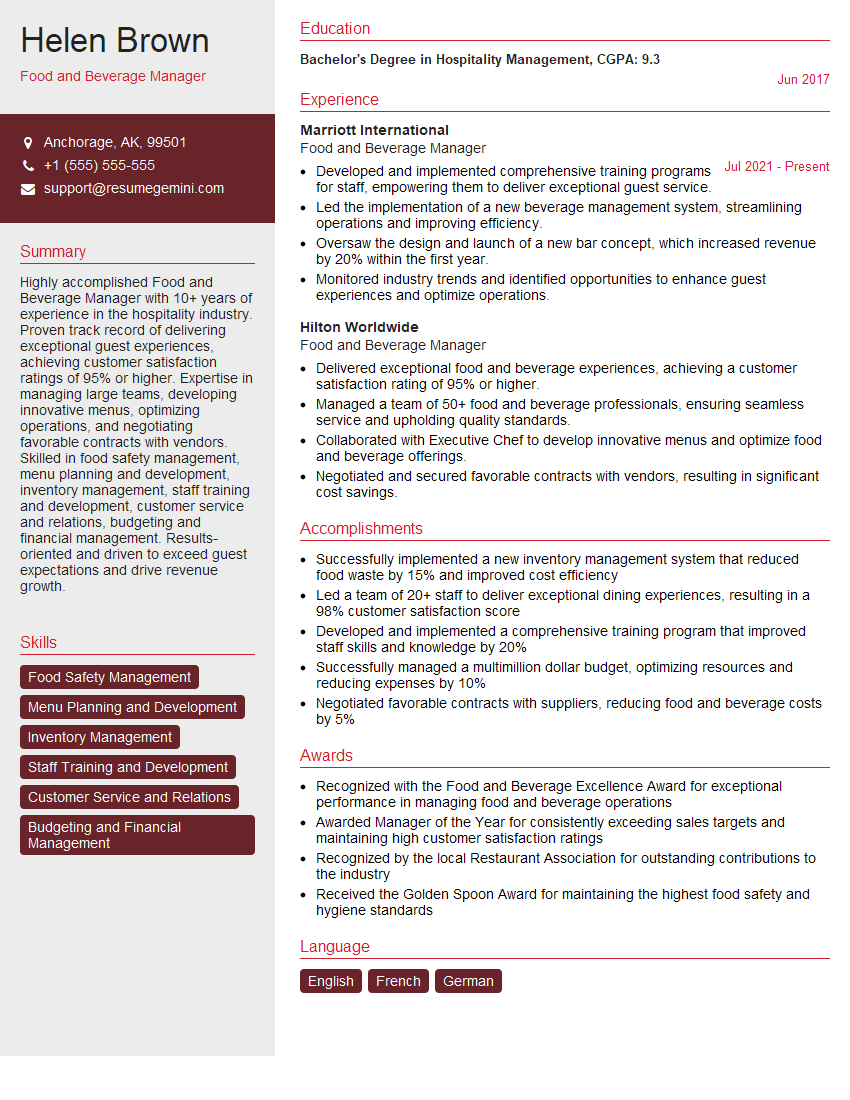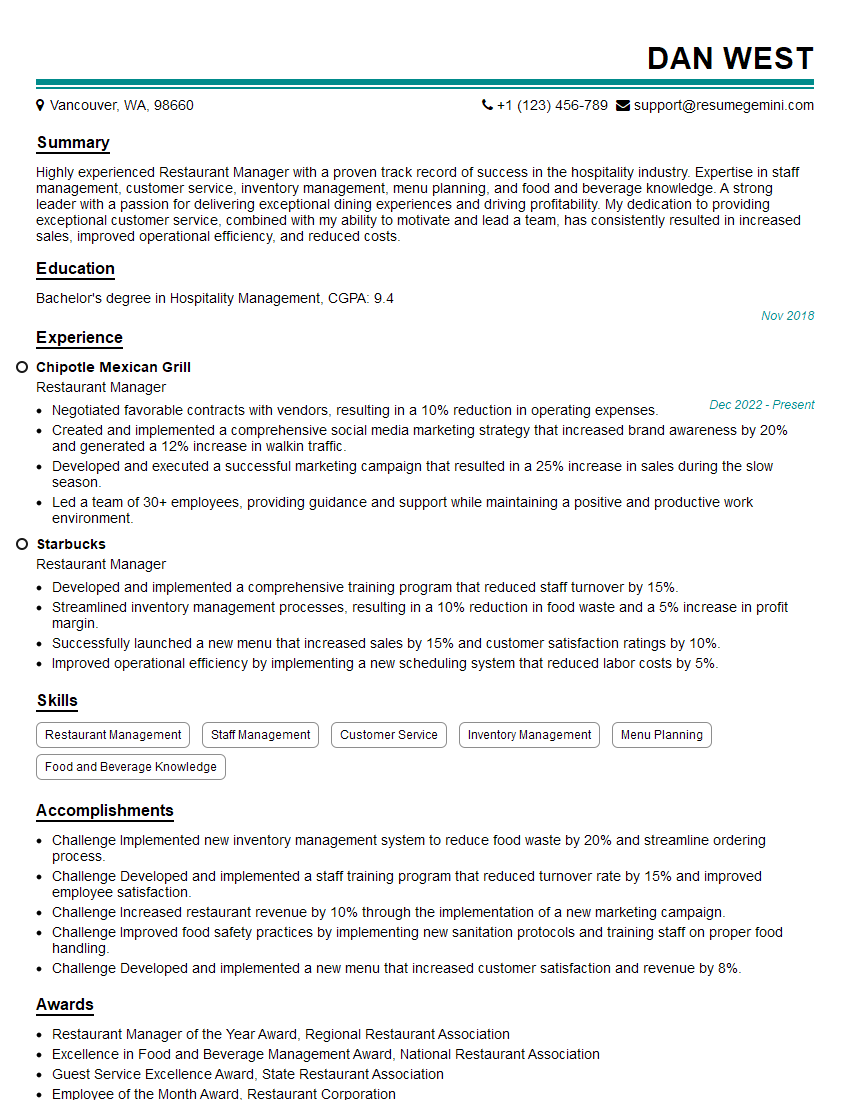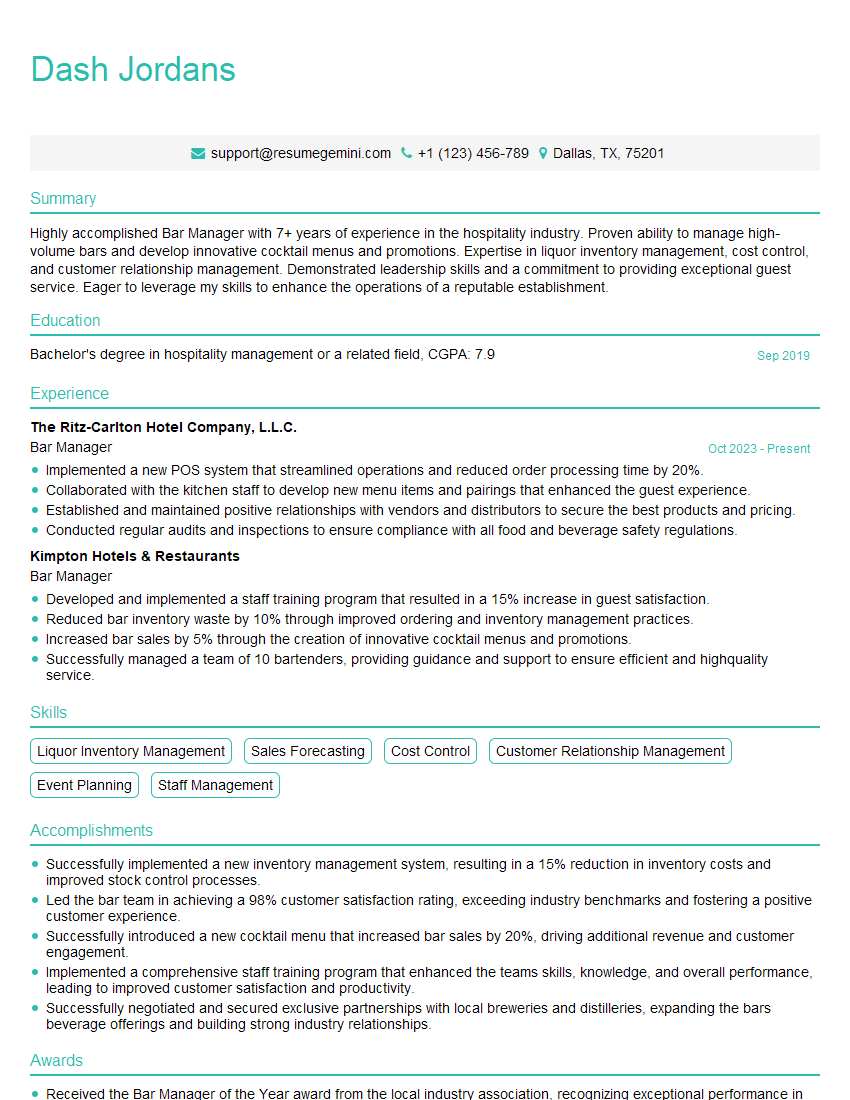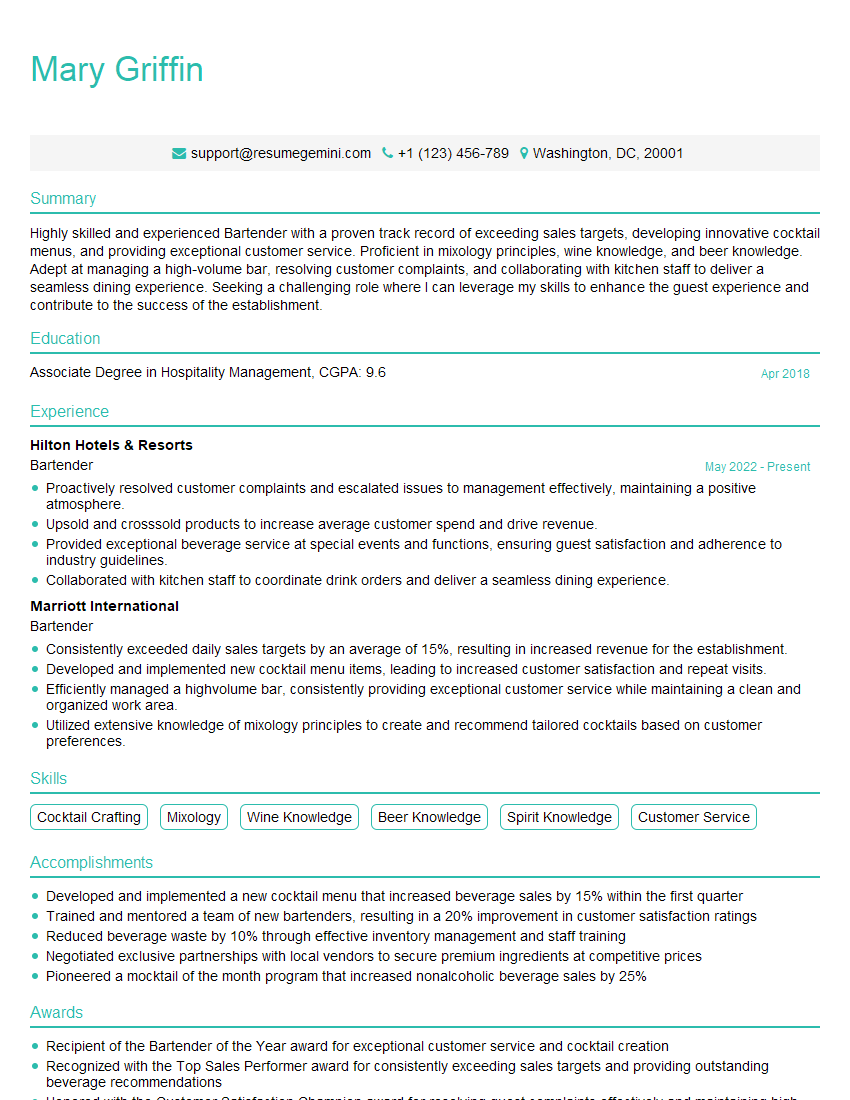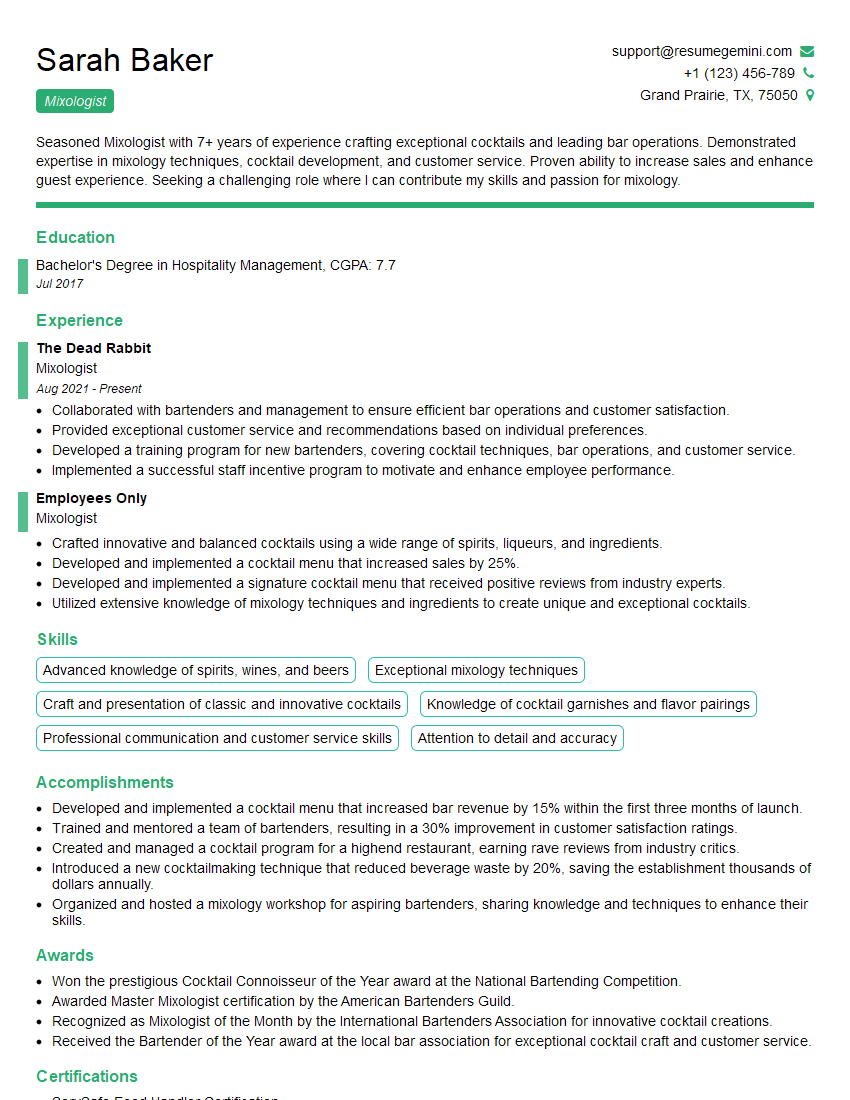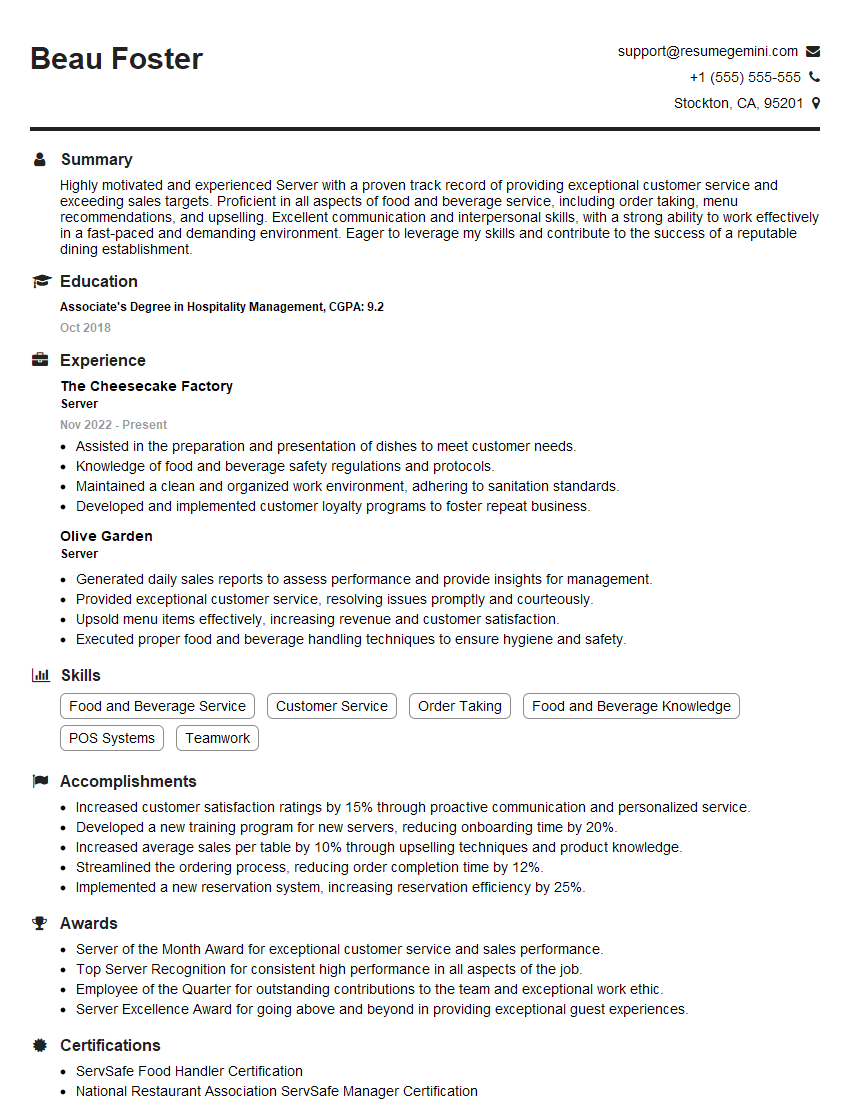Preparation is the key to success in any interview. In this post, we’ll explore crucial Understanding and respecting the legal responsibilities of serving alcohol interview questions and equip you with strategies to craft impactful answers. Whether you’re a beginner or a pro, these tips will elevate your preparation.
Questions Asked in Understanding and respecting the legal responsibilities of serving alcohol Interview
Q 1. What are the legal drinking ages in your state/region?
The legal drinking age in most U.S. states and many other countries is 21. This means that individuals under the age of 21 are prohibited from purchasing, possessing, or consuming alcohol. There are some exceptions, such as religious ceremonies or private events under specific circumstances, but these are tightly regulated. It’s crucial for anyone serving alcohol to be intimately familiar with the laws of their specific jurisdiction, as there might be slight variations. Failure to adhere to these laws can result in severe penalties.
Q 2. How would you identify and refuse service to a visibly intoxicated person?
Identifying a visibly intoxicated person requires careful observation. I look for several key indicators: slurred speech, unsteady gait, disoriented behavior, difficulty maintaining balance, bloodshot eyes, and strong smell of alcohol. If I suspect intoxication, I engage in a brief, polite conversation, asking simple questions to assess their cognitive function. If their responses are unclear or they exhibit any of the signs mentioned above, I’ll politely but firmly refuse further service. I explain that I’m legally obligated to do so and offer alternatives, like water or a non-alcoholic beverage, and if necessary, assist in getting them a safe ride home. Documentation of the incident, including the time, date, and description of the patron’s behavior, is critical.
Q 3. What are the penalties for serving alcohol to a minor?
The penalties for serving alcohol to a minor are significant and can vary by jurisdiction, but they often include steep fines, suspension or revocation of liquor licenses, and even jail time. These penalties reflect the severity of the offense, recognizing that providing alcohol to minors contributes to underage drinking, which has devastating consequences for their health, safety, and development. The consequences can extend to the establishment’s reputation, leading to public backlash and potential loss of revenue. For example, a bar owner could face thousands of dollars in fines and a temporary closure. This emphasizes the absolute necessity of stringent ID checks and responsible alcohol service practices.
Q 4. Explain the concept of ‘dram shop liability’.
Dram shop liability is a legal doctrine that holds businesses that serve alcohol responsible for injuries or damages caused by intoxicated patrons. This means if a bar or restaurant serves alcohol to someone who is visibly intoxicated and that person subsequently causes harm (e.g., in a car accident), the establishment can be held liable. The principle rests on the idea that businesses have a duty of care to prevent the over-service of alcohol and the subsequent harm caused by intoxicated individuals. The specifics of dram shop liability vary by state, but it’s a critical concern for anyone serving alcohol, underscoring the importance of responsible alcohol service procedures and thorough staff training.
Q 5. Describe your experience with checking IDs and verifying age.
I have extensive experience in checking IDs and verifying age. My process begins with a visual inspection of the ID to ensure it’s valid and hasn’t been altered. I check for inconsistencies between the photo and the individual presenting it. I then compare the birthdate on the ID to the legal drinking age, ensuring the person is indeed 21 or older. If there’s any doubt, I will not serve alcohol. I’ve completed training on recognizing fraudulent IDs, and I’m proficient at spotting common counterfeit techniques. My goal isn’t to be overly intrusive, but to be responsible and ensure compliance with the law. I’ve had instances where I’ve refused service due to questionable IDs, and this has always been the right decision, protecting both my establishment and the community.
Q 6. How would you handle a situation where a patron becomes aggressive after consuming alcohol?
Handling an aggressive patron after alcohol consumption requires a calm and measured response. My first priority is to ensure the safety of myself, my staff, and other patrons. I would immediately cease serving alcohol to the individual. I would try to de-escalate the situation by speaking calmly and respectfully, avoiding confrontation. If de-escalation attempts are unsuccessful, I would call the authorities, providing a detailed description of the individual and the situation. The safety of everyone involved is paramount. Removing the person from the premises, while ensuring their safety, should also be considered. Proper documentation of the incident and any injuries sustained is essential for legal protection.
Q 7. What are your strategies to prevent underage drinking at your establishment?
My strategies for preventing underage drinking include: thorough and consistent ID checks for all patrons who appear to be under 30; employee training on responsible alcohol service, including recognizing fake IDs; visible signage clearly stating the legal drinking age and penalties for serving minors; proactive measures to deter underage entry, like employing security personnel; regular reviews of our alcohol service procedures to identify areas for improvement; and cooperation with local law enforcement on initiatives aimed at preventing underage drinking. Proactive strategies are crucial in maintaining a responsible and safe environment, while minimizing the risks associated with alcohol sales. We aim to create a culture of responsible service within our establishment.
Q 8. How familiar are you with your state/region’s alcohol service regulations?
I possess an extremely thorough understanding of my state’s alcohol service regulations. My knowledge encompasses all aspects, from licensing requirements and permitted hours of operation to the specifics of serving alcohol to minors, intoxicated individuals, and those who appear visibly impaired. I regularly review updates to these regulations to ensure complete compliance. For example, I’m familiar with the nuances of our state’s ‘dram shop’ laws, which detail the liability of establishments that serve alcohol to patrons who subsequently cause harm while intoxicated. I also stay updated on any changes in server training requirements or restrictions on promotional activities.
Q 9. What steps would you take if you suspect someone is driving under the influence after leaving your establishment?
Suspecting someone is driving under the influence is a serious matter. My first step would be to discreetly observe the individual’s behavior – are they stumbling, slurring their speech, or exhibiting other signs of intoxication? If my suspicions are confirmed, I would take several actions. First, I would politely, but firmly, refuse to serve them any more alcohol. Second, I would encourage them to utilize alternative transportation methods, such as calling a taxi, ride-sharing service, or a designated driver. Third, and critically, I would try to subtly prevent them from driving. This might involve offering to help them call a ride or even speaking to a trusted friend or family member who could pick them up. If they insist on driving, I would directly and respectfully intervene. While I would avoid physical confrontation, I would clearly state my concerns and attempt to dissuade them from driving. In certain situations, calling the police might be necessary if their behavior poses an imminent threat to public safety. Documenting the incident is also important – noting the time, the individual’s behavior, and any steps taken is crucial in protecting the establishment’s liability.
Q 10. How do you ensure staff are properly trained in responsible alcohol service?
Ensuring staff are properly trained is paramount. We conduct comprehensive training sessions that cover all aspects of responsible alcohol service, including identifying signs of intoxication, refusal techniques, and the legal ramifications of serving alcohol irresponsibly. This training is not a one-time event; we regularly conduct refresher courses and incorporate scenario-based training to reinforce best practices. Our program aligns with our state’s regulations for server training and often surpasses them. For instance, we use role-playing exercises to simulate challenging customer interactions and provide feedback on effective response strategies. We also provide regular updates on any changes in alcohol service laws and best practices in the industry, using online resources and industry-specific training materials. Employee performance is regularly evaluated on their adherence to these responsible service policies.
Q 11. Explain the process for reporting alcohol-related incidents.
Our process for reporting alcohol-related incidents is well-defined and ensures accurate and timely reporting. Any incident, from a minor altercation to a suspected DUI, is documented immediately, including details like the date, time, location, individuals involved, and a detailed account of the events leading up to and following the incident. This documentation is kept in a secure location. Depending on the severity of the incident, we’ll report to the relevant authorities. For instance, if a fight breaks out involving alcohol consumption, we’d involve law enforcement. If a patron leaves intoxicated, we may make a note of it. For serious incidents involving injuries, we would contact emergency medical services and law enforcement immediately. We have established procedures for collaborating with law enforcement during investigations, offering our documented records and cooperating fully. Maintaining accurate and complete records assists in managing liability and protecting our establishment.
Q 12. Describe your understanding of blood alcohol content (BAC) levels and their implications.
Blood Alcohol Content (BAC) refers to the percentage of alcohol in a person’s bloodstream. Legal limits vary by location, but generally, a BAC of 0.08% or higher is considered legally intoxicated for driving. At lower levels (e.g., 0.05%), impairment may still be present, affecting judgment, coordination, and reaction time. As BAC increases, the level of impairment increases significantly, leading to potentially dangerous behaviors. A BAC of 0.15% or higher indicates significant impairment and a significantly increased risk of accidents. Understanding BAC levels is crucial for responsible alcohol service. Our staff are trained to recognize the behavioral signs associated with different BAC levels, even if we don’t have access to the person’s actual BAC level. This awareness allows us to intervene effectively and prevent potential harm.
Q 13. How do you manage inventory to prevent alcohol theft or misuse?
Preventing alcohol theft and misuse requires a multi-pronged approach. We utilize a sophisticated inventory management system to track alcohol purchases, stock levels, and consumption. This allows us to detect any discrepancies that might indicate theft or unusual patterns of consumption. Regular inventory checks, ideally by different personnel each time, minimize the chances of theft going unnoticed. We also employ strict procedures for accessing and dispensing alcohol. Only authorized staff can access storage areas, and all alcohol transfers are recorded. Staff are trained to spot attempts at theft or misuse and report any suspicious behavior. Finally, we maintain a secure storage area with controlled access, using physical security measures like locks and surveillance cameras.
Q 14. What measures do you implement to ensure responsible alcohol promotions?
Responsible alcohol promotions are vital. We avoid promotions that encourage excessive drinking or target underage consumers. Any promotional activity must comply with all applicable laws and regulations. For example, we avoid ‘drink specials’ that incentivize rapid consumption. We may offer discounted prices on particular beverages or food and beverage pairings, but only those which do not encourage excessive drinking. We clearly communicate our commitment to responsible alcohol service in all our promotions. All promotional materials are reviewed carefully for compliance and appropriateness before use, paying close attention to language and messaging.
Q 15. How would you handle a situation involving a patron who is refusing to leave?
Handling a patron refusing to leave requires a calm and measured approach, prioritizing safety and de-escalation. First, I’d assess the situation: are they intoxicated, disruptive, or simply misunderstanding something? I would politely but firmly reiterate that it’s closing time (or whatever the relevant reason is) and that they need to leave. If they remain uncooperative, I would:
- Attempt de-escalation: Speak calmly and respectfully, offering a compromise if possible (e.g., helping them find a taxi).
- Involve a manager or supervisor: Having a second, more senior person present can often diffuse the situation.
- Call the police: As a last resort, if the patron is becoming aggressive or threatening, I would call the police. This is crucial for the safety of staff and other patrons. I would clearly explain the situation to the dispatcher, emphasizing any threats or violent behavior.
- Document everything: I would meticulously document the entire incident, including the time, the patron’s behavior, any statements made, and the actions taken, including the names of anyone involved.
It’s vital to avoid physical confrontation – this is both dangerous and could lead to legal repercussions. My primary focus would always be on de-escalation and ensuring the safety and security of everyone present. For example, once I had a patron who was upset about a bill, becoming increasingly loud and aggressive. By calmly explaining the charges and offering to check the bill again, along with offering a complimentary drink as a gesture of goodwill, I was able to de-escalate the situation peacefully. The situation was then handled swiftly and professionally.
Career Expert Tips:
- Ace those interviews! Prepare effectively by reviewing the Top 50 Most Common Interview Questions on ResumeGemini.
- Navigate your job search with confidence! Explore a wide range of Career Tips on ResumeGemini. Learn about common challenges and recommendations to overcome them.
- Craft the perfect resume! Master the Art of Resume Writing with ResumeGemini’s guide. Showcase your unique qualifications and achievements effectively.
- Don’t miss out on holiday savings! Build your dream resume with ResumeGemini’s ATS optimized templates.
Q 16. What is your understanding of different types of alcohol licenses?
Alcohol licenses vary widely depending on location and the type of establishment. Generally, they regulate the sale and service of alcoholic beverages and ensure compliance with local laws. Some common types include:
- On-premises licenses: These permit the sale and consumption of alcohol on the premises, such as in bars and restaurants.
- Off-premises licenses: These allow the sale of alcohol for consumption off the premises, like liquor stores.
- Manufacturer’s licenses: These are for breweries, wineries, and distilleries.
- Wholesaler’s licenses: These cover businesses that distribute alcohol to retailers.
- Special event permits: These are temporary licenses for specific events like festivals or weddings.
The specific requirements for each license type can vary significantly. For example, on-premises licenses often involve restrictions on operating hours, the types of alcohol sold, and security measures that must be implemented. Understanding these legal nuances is critical to avoid penalties and maintain compliance. For instance, in my previous role we were required to have specific signage and training records for our license to remain valid, this information needs to be stored securely and easily accessible.
Q 17. How would you respond to a customer complaint regarding alcohol service?
Responding to customer complaints regarding alcohol service requires empathy, professionalism, and a commitment to resolving the issue. My approach would be:
- Listen attentively: I would let the customer fully explain their complaint without interruption, showing genuine empathy and understanding.
- Apologize sincerely: Even if the complaint isn’t entirely justified, a sincere apology can go a long way in diffusing the situation.
- Investigate the issue: I would thoroughly investigate the complaint, speaking to any witnesses or staff involved to gather all the facts.
- Offer a solution: Depending on the nature of the complaint, I would offer a suitable solution, such as a refund, replacement drink, or discount on their next visit.
- Follow up: I would follow up with the customer to ensure they are satisfied with the resolution. This shows that I value their business and am committed to providing excellent service.
I remember one time a customer complained their drink wasn’t strong enough. By calmly listening and speaking to my bartender, we discovered a miscommunication and made a new drink. The customer was pleased with my empathetic response. Documentation of the resolution would be added to the customer’s account.
Q 18. What are some common signs of intoxication?
Recognizing the signs of intoxication is crucial for responsible alcohol service. It’s important to remember that these signs can vary from person to person, and the presence of several signs strongly indicates intoxication. Some common indicators include:
- Slurred speech: Difficulty speaking clearly or articulating words.
- Loss of coordination: Difficulty walking, stumbling, or fumbling objects.
- Flushed face: Reddened skin indicating increased blood flow.
- Disordered thoughts or behavior: Acting erratically, being overly loud or boisterous, or making poor decisions.
- Impaired judgment: Making unsafe choices, ignoring advice, or engaging in risky behaviors.
- Strong body odor: Alcohol can sometimes produce a distinct odor on the breath or skin.
- Nausea or vomiting: Physiological effects of excessive alcohol consumption.
It’s essential to consider the totality of the signs, as the absence of a single indicator doesn’t rule out intoxication. Training staff to recognize and respond to these cues is critical to preventing incidents and ensuring public safety.
Q 19. How do you ensure the safety of your staff while serving alcohol?
Ensuring staff safety while serving alcohol involves a multi-faceted approach focusing on prevention and response.
- Thorough training: Staff should receive comprehensive training on recognizing signs of intoxication, responsible alcohol service, de-escalation techniques, and emergency procedures.
- Adequate staffing: Having enough staff on duty, especially during peak hours, helps ensure there are always enough people to handle potential issues and support each other.
- Security measures: Implementing security measures, such as video surveillance, well-lit areas, and readily available emergency call buttons, enhances safety and provides a deterrent to trouble.
- Clear procedures: Establishing clear procedures for handling disruptive patrons, intoxicated individuals, or any potential threats is crucial for a coordinated response.
- Regular staff meetings: Regular staff meetings provide a forum to review safety procedures, share experiences, and address any concerns or questions.
- Emergency response plan: Developing a well-defined emergency response plan is essential for handling any crisis effectively and safely.
For example, we conducted regular safety training and had a designated staff member always man the exit door during peak times, reducing the chance of any conflict.
Q 20. Explain your experience with handling intoxicated patrons.
I have extensive experience in handling intoxicated patrons, gained over several years in various hospitality settings. My approach prioritizes safety and de-escalation. I’ve handled situations ranging from mildly disruptive behavior to more serious incidents involving aggression. In each case, my focus has been on:
- Assessing the situation: Quickly determining the level of intoxication and the potential for escalation.
- De-escalation techniques: Using calm, respectful communication and avoiding confrontation to diffuse tense situations.
- Refusal of service: If necessary, politely and firmly refusing further service to intoxicated patrons, explaining the reasons clearly and respectfully.
- Providing assistance: Offering assistance such as calling a taxi or contacting friends or family to ensure their safe departure.
- Seeking support: When necessary, seeking help from other staff members or security personnel.
I’ve had to intervene in numerous cases where customers became increasingly intoxicated and disruptive. For instance, I had a patron who became verbally abusive after drinking too much. By calmly speaking to them, explaining the rules, and providing a non-alcoholic beverage, we were able to de-escalate the situation. If that had not worked, we would have called security and then the police if needed. In each of these situations my goal is to resolve the conflict peacefully and ensure the safety of our staff and the other patrons. The documentation of these incidents was strictly followed and is readily available.
Q 21. Describe a time you had to refuse service to a customer.
I have had to refuse service to customers on several occasions, primarily due to intoxication. The process I follow is always based on a polite, yet firm approach. I never want to make a customer feel singled out or humiliated, but my responsibility to public safety overrides other concerns. I first start by observing the customer’s behavior and checking for signs of intoxication using the guidance I received during my training. If they display several signs of being intoxicated such as slurred speech and impaired judgement, I would politely explain that they’ve had enough to drink and I cannot serve them anymore. I will highlight that it’s for their safety and well-being, and the safety of others. I then offer to help them get a taxi or contact their friends/family. I meticulously document the incident, including the time, the patron’s behavior, what was said, and the actions I took. One particular incident involved a customer who had clearly consumed too much alcohol and was becoming increasingly loud and disruptive. After politely refusing him further service, he became aggressive. I immediately alerted my manager, who then called the police. It was a challenging situation but handled professionally.
Q 22. What are your strategies for preventing over-service of alcohol?
Preventing over-service is paramount to responsible alcohol service. My strategy is multi-pronged, focusing on observation, pacing, and intervention. It begins with trained staff who are vigilant in observing patron behavior. We use techniques like the PACE method (Pace yourself, Alternate alcoholic and non-alcoholic drinks, Choose low-alcohol options, Eat food while drinking) to encourage responsible consumption. We actively look for signs of intoxication, such as slurred speech, impaired coordination, or aggressive behavior. If we suspect over-service, we implement a refusal to serve policy, politely but firmly declining further alcohol sales to the individual. We also provide alternative options like water or non-alcoholic beverages. In some instances, we may offer to help the patron arrange a safe ride home. Regular staff training and refresher courses are vital to maintaining this vigilance and ensuring consistent application of our policies.
For example, if a patron orders multiple strong drinks in rapid succession, I would intervene. I might suggest they try a non-alcoholic drink, point out the pace of their consumption, and subtly remind them of responsible choices. If their behavior continues to deteriorate, we would refuse service and offer assistance in getting home safely.
Q 23. How do you keep accurate records of alcohol sales and inventory?
Maintaining accurate records is crucial for legal compliance and inventory management. We utilize a combination of point-of-sale (POS) systems and physical inventory checks. Our POS system automatically tracks all alcohol sales, recording the type of beverage, quantity sold, time of sale, and the server’s ID. This data provides a detailed audit trail. Regularly scheduled physical inventory checks are conducted to reconcile the POS data with the actual stock on hand. This process helps identify discrepancies, which may indicate theft or inaccurate pour practices. Any discrepancies are investigated to determine the cause and implement corrective actions. We meticulously document any inventory adjustments, such as stock replenishments or disposal of spoiled goods.
All records are stored securely, both electronically and physically, following all relevant regulations and guidelines concerning data retention and privacy. This meticulous record-keeping is not just about complying with the law; it’s about ensuring operational efficiency and preventing losses.
Q 24. How familiar are you with the regulations concerning the sale of alcohol to specific individuals or groups?
I am intimately familiar with regulations concerning the sale of alcohol to minors (those under the legal drinking age), visibly intoxicated individuals, and individuals with a history of alcohol abuse or related disorders. I understand the legal ramifications of serving anyone in these categories. We employ a strict identification policy, requiring all patrons who appear to be under the legal drinking age to present a valid, government-issued photo ID. This policy also applies to individuals who appear intoxicated to be extra cautious. We are trained to recognize signs of intoxication and have a zero-tolerance policy for serving already intoxicated persons. Further, we are trained to respectfully but firmly refuse service to anyone who exhibits erratic, disruptive or otherwise concerning behaviors, even if their age is verifiable. We have a clear understanding of the legal consequences of non-compliance, including fines, license suspension, or even criminal charges.
Q 25. How would you handle a situation where a patron becomes disruptive or violent?
Handling disruptive or violent patrons requires a calm, decisive, and safe approach. My first priority is the safety of all patrons and staff. I would immediately call for security personnel or law enforcement, depending on the severity of the situation. If safe to do so, I would attempt to de-escalate the situation by speaking calmly and reassuringly to the individual. I would avoid any confrontational language or body language. Once security or law enforcement arrives, I would cooperate fully with their instructions. We have protocols in place for such incidents, and our staff receives regular training on de-escalation techniques and emergency procedures. We also maintain detailed incident reports for any such event to inform future training and prevention protocols.
For instance, if a patron becomes verbally abusive, I would try to calm them by speaking in a gentle tone and offering alternative solutions. However, if they become physically aggressive, I would immediately prioritize the safety of others, call security, and maintain a safe distance.
Q 26. Describe your understanding of the legal consequences of failing to comply with alcohol service regulations.
The legal consequences of failing to comply with alcohol service regulations are significant and can vary depending on the specific violation and jurisdiction. These can include hefty fines, license suspension or revocation, and even criminal charges. Serving minors, over-serving intoxicated individuals, or failing to maintain proper records can all lead to severe penalties. In addition to direct legal repercussions, businesses can face reputational damage and loss of revenue. Liability for accidents or injuries caused by intoxicated patrons can also fall on the establishment. Therefore, complying with all regulations is not just a legal requirement but also crucial for protecting the business and ensuring the safety and well-being of all patrons and staff. Regular legal consultation and staff training are necessary for mitigation.
Q 27. What training have you undertaken related to responsible alcohol service?
I have completed extensive training in responsible alcohol service, including a state-certified program covering all aspects of legal compliance and safe alcohol service practices. This training covered topics such as legal regulations, identification procedures, recognizing signs of intoxication, responsible alcohol server techniques, de-escalation strategies, and handling disruptive behavior. I’ve also participated in regular refresher courses to stay up-to-date on any changes to regulations or best practices. My training includes hands-on simulations and role-playing exercises to reinforce the lessons learned. I am committed to ongoing professional development and staying informed about industry standards and legal updates. This is reflected in my ongoing pursuit of resources and information relevant to this field.
Key Topics to Learn for Understanding and Respecting the Legal Responsibilities of Serving Alcohol Interview
- Legal Drinking Age & Identification Verification: Understanding and applying regulations concerning verifying the age of patrons, including acceptable forms of identification and procedures for handling suspected underage drinking.
- Responsible Service of Alcohol (RSA) Practices: Knowing and applying best practices for responsible alcohol service, including recognizing signs of intoxication, refusing service to intoxicated individuals, and pacing drink orders.
- Alcohol-Related Liability & Risk Management: Understanding the legal liabilities associated with serving alcohol, including potential consequences of over-serving or serving minors, and implementing strategies to mitigate risks.
- State & Local Regulations: Familiarizing yourself with specific state and local laws and ordinances pertaining to alcohol service, including permit requirements, hours of operation, and restrictions on alcohol sales.
- Server Training & Certification: Understanding the importance of server training programs and certifications, and the role they play in demonstrating competency and adhering to legal standards.
- Handling Intoxicated Patrons & Conflict Resolution: Developing strategies for safely and effectively managing intoxicated patrons, de-escalating conflicts, and ensuring the safety of both staff and patrons.
- Documentation & Record Keeping: Understanding the importance of maintaining accurate records related to alcohol sales, incidents involving intoxicated patrons, and any other relevant information for legal compliance.
Next Steps
Mastering the legal responsibilities of serving alcohol is crucial for career advancement in the hospitality industry, opening doors to greater responsibility and higher earning potential. A well-crafted resume is your key to unlocking these opportunities. Building an ATS-friendly resume significantly increases your chances of getting noticed by potential employers. We recommend using ResumeGemini to build a professional and impactful resume that showcases your skills and experience effectively. ResumeGemini provides examples of resumes tailored to roles emphasizing understanding and respecting the legal responsibilities of serving alcohol, helping you present yourself as the ideal candidate.
Explore more articles
Users Rating of Our Blogs
Share Your Experience
We value your feedback! Please rate our content and share your thoughts (optional).
What Readers Say About Our Blog
Dear Sir/Madam,
Do you want to become a vendor/supplier/service provider of Delta Air Lines, Inc.? We are looking for a reliable, innovative and fair partner for 2025/2026 series tender projects, tasks and contracts. Kindly indicate your interest by requesting a pre-qualification questionnaire. With this information, we will analyze whether you meet the minimum requirements to collaborate with us.
Best regards,
Carey Richardson
V.P. – Corporate Audit and Enterprise Risk Management
Delta Air Lines Inc
Group Procurement & Contracts Center
1030 Delta Boulevard,
Atlanta, GA 30354-1989
United States
+1(470) 982-2456
